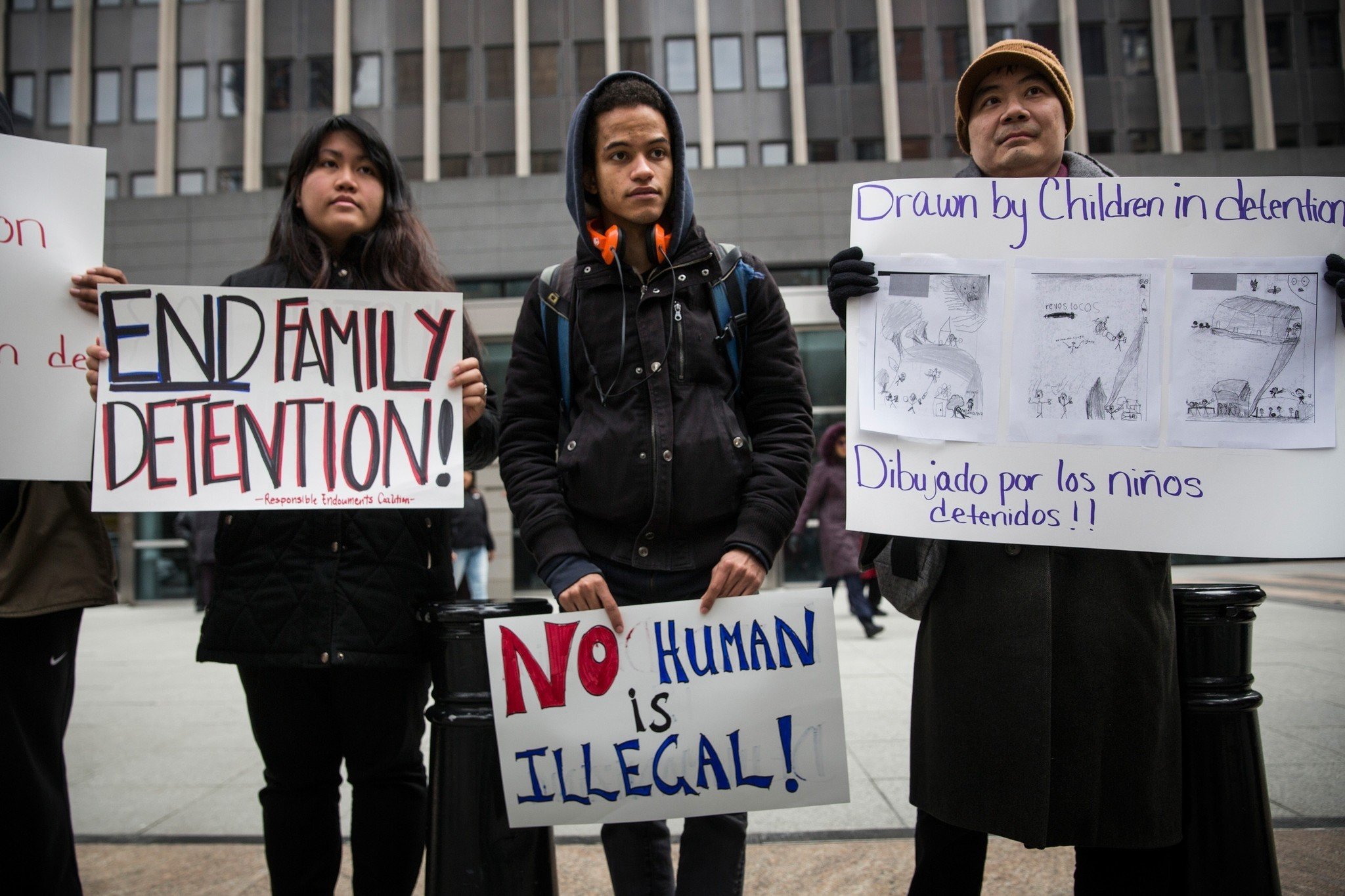No More Stolen Elections!
Unite for Voting Rights and Democratic Elections
Judge rules detaining asylum-seekers in order to deter others is illegal
By '>
Molly Hennessy-Fiske for LA Times


Claudia Velasquez, a Honduran immigrant held with her 7-year-old daughter since October in a federal detention facility, looked at the judge Monday via a video hookup as he considered her request for bond.
Velasquez and nearly 1,000 mothers and children were being held at three family detention centers around the country, part of a massive federal effort to stem the influx of immigrants on the southern border last year by keeping those who succeeded in crossing illegally locked up.
On Friday, the policy was rejected by a federal judge in Washington who issued an injunction barring the government from detaining immigrants as a way of deterring others.
Although the Homeland Security Department was still reviewing the ruling Monday, a lawyer for the department did not oppose Velasquez’s bond Monday.
An immigration judge set her bond at $1,500 — a modest sum that her family in Compton said they would raise that day.
“Thank God,” Velasquez, 33, exclaimed, clapping her hands as her face lit up.
It was a small victory, but still an improvement, said Velasquez’s attorney, Linda Brandmiller.
“That I believe is a direct result of the Friday decision,” Brandmiller said, calling it “a step forward.”
Immigration lawyers said it was still too early to tell whether families would be freed more quickly as a result of last week's ruling, but they were hopeful.
“The big question is whether the government is taking a different position” on the women's cases from the moment they are detained, said Judy Rabinovitz, deputy director of the Immigrants' Rights Project at the American Civil Liberties Union, which filed the lawsuit.
Rabinovitz said she hoped the government would move to release those immigrants on their own recognizance instead of detaining them for months of court hearings.
“What we really want to see is that people aren't going to even need bond hearings,” she said.
The Homeland Security Department was overwhelmed last summer by a surge of mostly Central American families and children crossing the southern border illegally, more than 68,000 last year.
The Obama administration responded by expanding detention centers for youths and families, opening new family facilities in New Mexico and Texas, in addition to the existing 96-bed facility in Leesport, Pa.
The 700-bed New Mexico center has since closed, but two in Texas are still expanding. A 532-bed facility in Karnes City is set to double in size and a 480-bed facility to the west in Dilley will eventually house 2,400.
In December, the American Civil Liberties Union sued the administration on behalf of asylum-seeking mothers who fled violence in Central America and were detained even after they had been found by a U.S. immigration officer or judge to have a “credible fear” of persecution back home.
They argued the administration was categorically refusing to release mothers and children eligible for asylum, characterizing them as a threat to national security and their continued detention as a deterrent to others who would cross the border illegally.
Marsha Catron, a spokeswoman for the Homeland Security Department, said officials were still reviewing the ruling Monday and had not decided whether to revise their detention policies or to appeal.
With no clear statement from the government, immigration attorneys in San Antonio were uncertain.
Geovanna Guimbarda was not optimistic when she arrived to represent half a dozen clients. “I'm not terribly hopeful,” she said.
Then the attorney for Homeland Security offered to negotiate bond for a 31-year-old Guatemalan woman and her 13-year-old daughter. Guimbarda requested $6,000 — and got it.
“I don't know if I should have gone lower,” she said afterward, surprised. “I just sort of thought about the bonds of the last few weeks. I think it worked out well.”
Later, her other clients won release on bonds of $3,500 and $3,000.
When the judge called Velasquez's case at 10:35 a.m., the immigrant appeared via video from Karnes wearing a large white sweatshirt, her hair brushed back from her worried face.
Immigration Judge Glenn P. McPhaul asked whether Velasquez was a flight risk.
“All of her immediate family have legal status,” Brandmiller told him. “Her entire family is in the U.S., no criminal history.”
The government lawyer did not file the usual packet of documents arguing against bond based on immigrant mothers encouraging illegal crossings and posing a threat to national security. She did not oppose the bond request or ask questions.
Velasquez’s sister Eliana Toro, 25, a dispatcher at a transport company, said she was pleasantly surprised by the low bond — the Compton family had been expecting up to $7,000, and were ready to take out loans against their cars or homes.
Relatives were eager to get the mother and child out of detention. They tried to pay the bond in downtown Los Angeles, but got delayed by a long line and were told to return Tuesday.
They planned to rise before dawn to free the pair as soon as possible.
“It breaks our heart little by little knowing they’re there,” Toro said.
GeneralDemocracy SquareLiberty Tree FoundationLiberty Tree FoundationDemocracy SquareLiberty Tree Foundation 